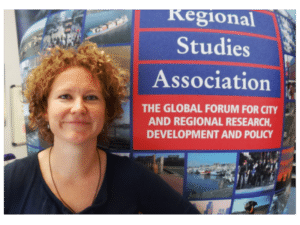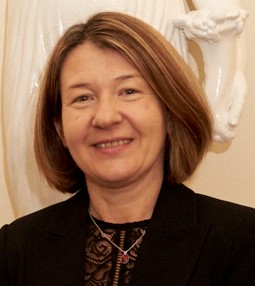Daniela Carl is Deputy Chief Executive at the Regional Studies Association. With a background in geography, Daniela has worked in a variety of research and enterprise roles at HEI in Germany, New Zealand and the UK. Daniela has 15 years of work experiences in international academic conference management and knowledge exchange. She is passionate about the opportunities networking and the exchange of ideas can bring. In her previous Blog, she shares her tips for networking at conferences www.regionalstudies.org/news/conferences-networking-an-introverts-guide/
Alex Holmes is the Communications and Membership Manager at the Regional Studies Association. Prior to this she was a physics teacher for many years, working to engage more girls in STEM-related careers. Her PhD examined educational factors, including issues of gender, contributing to perceived declines in STEM graduates.
For us at the Regional Studies Association – a learned society for regional and urban researchers and policymakers – face-to-face meetings and conferences are an important part to facilitate networking, knowledge exchange and professional development. In 2019, we tentatively ventured towards running a virtual conference to allow participants who could not attend in person for reasons such as career responsibilities, financial or time constraints, along with those who are carbon footprint conscious and did not want to travel far to attend a conference remotely. We introduced a virtual element into our 2019 Student and Early Career Conference and following that, we decided to roll this out for a full conference.
The conference we designed was again for PhD students and early career researchers as we felt that the conference design, incorporating workshops and training sessions along with parallel paper sessions, would provide an ideal foundation where both remote and in-person participants could present their research, gain feedback and also participate in workshop discussions.
The RSA Student and Early Career conferences have been run for many years and the audience and concept of this conference series seemed most suitable to trial our first virtual conference. The conference would feature workshops run by established and senior academics that cover key topics previously identified as important by early researchers, including ‘Successfully Applying for Research Grants’, ‘Publishing Academic Papers’, and ‘How to Engage with the Media’.
We were very excited about running a conference virtually although we recognised the need to learn new technical skills and ways of engaging participants. For this purpose, we linked up with organisers who had already run successful virtual conferences to learn from them. From their feedback it was evident that IT infrastructure was key to running a successful virtual conference, so we partnered with Staffordshire University in the UK with its state-of-the-art IT and recording facilities. We were grateful that the university leadership valued our vision and came on board.
When developing the conference, we kept in mind that people attend conferences to network with potential research partners or employers, and to exchange and gain new knowledge, and to receive feedback which helps to polish a paper towards publication1.
So how could we ensure that our virtual conference delivered for these needs? We wanted to facilitate networking through regional hubs, where people get together locally and participate together. For our conference, two hubs were organised: one at Staffordshire University Business School in the UK and another at the Department of Economics at the Universidad del Norte in Colombia. These hubs would have prepared questions to facilitate discussions that would then be shared with other delegates joining remotely in other parts of the world.
Our earlier trial of remote sessions had found that engagement and feedback to presentations was tricky, so we planned for feedback to come from delegates both during the conference and for the two weeks afterwards when all presentations would be accessible online. This way we hoped the time zone issue would be eased as delegates from any part of the world could watch presentations and workshops they had missed or in case they wanted to revisit but also give richer feedback to presenters.
All this was arranged and the call for abstracts went out, but to our surprise the call had limited take up. We continued with plans regardless, as we wanted to make the conference work even with a small number of people who wanted to participate.
Then the Coronavirus pandemic hit the world.
This resulted in cancelled events and people moving to remote working from home. There was talk on social media that these new circumstances would change how we meet and communicate, and virtual conferences seemed a favoured option.
But with the new restrictions, the UK and Colombia hubs were cancelled, and as we simultaneously moved to hold a fully online conference, run remotely by us and the Staffordshire team, increasing numbers of registrants dropped out. Technical issues increased as the Internet infrastructure was increasingly burdened by numbers working from home and connections became increasingly unreliable.
We then made the difficult, and somewhat ironic, decision to cancel our virtual conference.
We have however learnt from our experience. The reasons for holding virtual events are still valid, and we are fully aware that virtual events open-up participation to many people across the world. We are using the remote-working time to research the best ways to design a virtual conference for maximum engagement by all participants. With this in mind, we are looking forward to the opportunity for holding a bigger and better virtual conference… so watch this space.
- Conference cancellations could have ‘big impact’ on research https://www.timeshighereducation.com/news/conference-cancellations-could-have-big-impact-research Accessed 19 March 20

Daniela Carl

Alex Holmes
Are you currently involved with regional research, policy, and development, and want to elaborate your ideas in a different medium? The Regional Studies Association is now accepting articles for their online blog. For more information, contact the Blog Editor at RSABlog@regionalstudies.org.